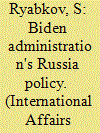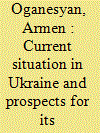| Srl | Item |
| 1 |
ID:
182901


|
|
|
| 2 |
ID:
180735


|
|
|
|
|
| Summary/Abstract |
A YEAR AGO, the leaders of Russia, France, Germany and Ukraine met in Paris to discuss and establish certain agreements for resolving the conflict in Ukraine. The "Normandy Format" meeting at such a high level suggested an impending breakthrough of the impasse in the southeastern Ukraine, but the Ukrainian side backpedaled once again, abandoning the already signed agreements. The civil war in Ukraine is still a bone of contention between Russia and Europe, affecting the security of the entire European region. The domestic conflict continues to destroy the Ukrainian state and economy while further splintering the country's population. What's next for Ukraine and the Donbass? To what extent is the Minsk process working for its participants?
|
|
|
|
|
|
|
|
|
|
|
|
|
|
|
|
| 3 |
ID:
190066


|
|
|
|
|
| Summary/Abstract |
Informal groupings have proliferated in EU foreign policy over the past decade, despite the enhanced role of the High Representative tasked with ensuring the coherence of this policy domain under the Lisbon Treaty. This article analyzes how the decision of select EU member states to act on certain policy issues through informal groupings, bypassing the EU framework, affects the High Representative’s room for maneuver. Drawing on the principal-agent model, the emergence of informal groupings is conceptualized as a manifestation of pathological delegation, which undermines High Representative’s role. The findings reveal two factors that may nevertheless increase the agent’s discretion in cases of delegation anomalies: the low heterogeneity of member state preferences toward the informal grouping and the interaction between agents in the same domain, facilitating agent’s performance. By examining agent's discretion when delegation anomalies arise, the article may be useful for scholars investigating delegation and agency in international organizations.
|
|
|
|
|
|
|
|
|
|
|
|
|
|
|
|
| 4 |
ID:
139733


|
|
|
|
|
| Summary/Abstract |
International Affairs: Mr. Ambassador, the Ukraine crisis shows convincingly that in the absence of wars between the leading states in the world, a special role is beginning to be played by information warfare, i.e., the struggle for the hearts and minds. This, however, does not change the essence. This still is about the striving to promote one's national interests and inflict a defeat on the "adversary." This is nothing new: The Crimean War and World War I were marked by active informational support, if this word can be used to describe direct official propaganda. If in the first case it was necessary to convince domestic public opinion about the necessity of military spending, in the second it was about the need to continue the war no matter how hopeless it seemed in late 1914. What could you tell our readers about the information warfare in the UK on the issue of Ukraine?
|
|
|
|
|
|
|
|
|
|
|
|
|
|
|
|